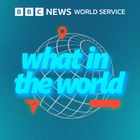
What in the World
Sep 12, 2024
Sickle cell is an inherited blood disorder caused by abnormal red blood cells. It can cause sudden bouts of severe pain, as well as fatigue, a stroke, even death. It’s one of the most common genetic disorders in the world, but there’s still some stigma and a lot of misunderstanding around the condition.
We hear from Dunstan Nicol-Wilson, who was born with the condition, about what it’s like to grow up with sickle cell, and whether people’s attitudes are changing.
Around 80% of sickle cell cases worldwide are in sub-Saharan Africa. Makuochi Okafor, BBC Africa health reporter, tells us how it is inherited and what the symptoms can be. Nigeria has the largest population of individuals with sickle cell in the world, so he tells us how sickle cell is treated there.
Also last year the UK became the first country in the world to license a new gene-editing tool known as Crispr, as a treatment for sickle cell disease. Kesewaa Browne, a journalist in the U.K. tells us what treatments are already available and how Crispr could change things.
nstagram: @bbcwhatintheworld WhatsApp: +44 0330 12 33 22 6 Email: [email protected] Presenter: Hannah Gelbart Producers: Benita Barden and Julia Ross-Roy Editor: Verity Wilde

